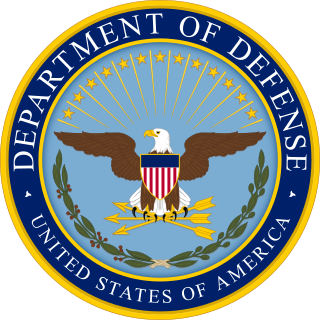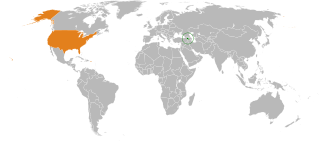
The Federation of American Scientists (FAS) is an American nonprofit global policy think tank with the stated intent of using science and scientific analysis to attempt to make the world more secure. FAS was founded in 1946 by scientists, including some who worked on the Manhattan Project, to develop the first atomic bombs. The Federation of American Scientists states that it aims to reduce the amount of nuclear weapons that are in use, and prevent nuclear and radiological terrorism. It says it aims to present high standards for nuclear energy's safety and security, illuminate government secrecy practices, as well as track and eliminate the global illicit trade of conventional, nuclear, biological and chemical weapons.

The Jewish Institute for National Security of America (JINSA), formerly named the Jewish Institute for National Security Affairs, is a Washington, D.C.-based, non-profit and pro-Israeli lobby and think tank. It was founded in 1976 focusing on issues of national security, advocating that Israel can play an important role in bolstering democracy. It claims it has a membership of 20,000.

The United States Institute of Peace (USIP) is an American federal institution tasked with promoting conflict resolution and prevention worldwide. It provides research, analysis, and training to individuals in diplomacy, mediation, and other peace-building measures.

Michèle Angélique Flournoy is an American defense policy advisor and former government official. She was Deputy Assistant Secretary of Defense for Strategy under President Bill Clinton and Under Secretary of Defense for Policy under President Barack Obama.
International Military Education and Training (IMET) is the title of a United States security assistance program, a type of student exchange program.

The military budget of the United States is the largest portion of the discretionary federal budget allocated to the Department of Defense (DoD), or more broadly, the portion of the budget that goes to any military-related expenditures. The military budget pays the salaries, training, and health care of uniformed and civilian personnel, maintains arms, equipment and facilities, funds operations, and develops and buys new items. The budget funds five branches of the US military: the Army, Navy, Marine Corps, Air Force, and Space Force.

The Defense Security Cooperation Agency (DSCA), as part of the United States Department of Defense (DoD), provides financial and technical assistance, transfer of defense materiel, training and services to allies, and promotes military-to-military contacts.

The United States under secretary of defense for policy (USDP) is a high level civilian official in the United States Department of Defense. The under secretary of defense for policy is the principal staff assistant and adviser to both the secretary of defense and the deputy secretary of defense for all matters concerning the formation of national security and defense policy.

In the U.S., critical infrastructure protection (CIP) is a concept that relates to the preparedness and response to serious incidents that involve the critical infrastructure of a region or the nation. The American Presidential directive PDD-63 of May 1998 set up a national program of "Critical Infrastructure Protection". In 2014 the NIST Cybersecurity Framework was published after further presidential directives.

The United States Department of Defense is an executive branch department of the federal government of the United States charged with coordinating and supervising all agencies and functions of the U.S. government directly related to national security and the United States Armed Forces. As of June 2022, the U.S. Department of Defense is the largest employer in the world, with over 1.34 million active-duty service members, including soldiers, marines, sailors, airmen, and guardians. The Department of Defense also maintains over 778,000 National Guard and reservists, and over 747,000 civilians bringing the total to over 2.87 million employees. Headquartered at the Pentagon in Arlington County, Virginia, just outside Washington, D.C., the Department of Defense's stated mission is to provide "the military forces needed to deter war and ensure our nation's security".
The United States government first recognized the usefulness of foreign aid as a tool of diplomacy in World War II. It was believed that it would promote liberal capitalist models of development in other countries and that it would enhance national security.

The Combined Security Transition Command – Afghanistan was a multinational, U.S. led, military organization during the War in Afghanistan.

The dissolution of the Soviet Union in December 1991 brought an end to the Cold War and created an opportunity for establishing bilateral relations between the United States with Armenia and other post-Soviet states as they began a political and economic transformation. The United States recognized the independence of Armenia on 25 December 1991, and opened an embassy in Armenia's capital Yerevan in February 1992.

Frank Graham Klotz served as Under Secretary of Energy for Nuclear Security and Administrator for the National Nuclear Security Administration of the U.S. Department of Energy. He was confirmed for the position on April 8, 2014, and retired on January 20, 2018.
Robert Edwards Hunter is an American government employee and foreign policy expert who served as United States ambassador to NATO during the Clinton administration.
Offsets are compensatory trade agreements, reciprocal trade agreements, between an exporting foreign company, or possibly a government acting as intermediary, and an importing entity. Offset agreements often involve trade in military goods and services and are alternatively called: industrial compensations, industrial cooperation, offsets, industrial and regional benefits, balances, juste retour or equilibrium, to define mechanisms more complex than counter-trade. Counter-trade can also be considered one of the many forms of defense offset, to compensate a purchasing country. The incentive for the exporter results from the conditioning of the core transaction to the acceptance of the offset obligation.

Michael Paul Pillsbury is a foreign policy strategist, author, and former public official in the United States. He is a senior fellow for China strategy at the The Heritage Foundation and has been Director of the Center on Chinese Strategy at the Hudson Institute in Washington, D.C. since 2014. Before Hudson, he held various postings in the U.S. Department of Defense and U.S. Senate. He has been called a "China-hawk", and an "architect" of Trump's signature policy on China.
The United States Department of Defense's Foreign Military Sales (FMS) program facilitates sales of U.S. arms, defense equipment, defense services, and military training to foreign governments. The purchaser does not deal directly with the defense contractor; instead, the Defense Security Cooperation Agency (DSCA) serves as an intermediary, usually handling procurement, logistics, and delivery, often providing product support, training, and infrastructure construction.

William J. Walker is a retired United States Army major general and former Sergeant at Arms of the U.S. House of Representatives. He was the 38th House Sergeant at Arms and the first African-American to hold the office. He last served as the 23rd Commanding General of the District of Columbia National Guard. This responsibility includes command of the District of Columbia Army and Air National Guard units. Walker previously served in the Drug Enforcement Administration as a Special Agent and was promoted to the Senior Executive Service in January 2003, with his final assignment being Deputy Assistant Administrator in Charge of the Office of Strategic Warning Intelligence. Walker is a member of the Council on Foreign Relations and a National Academy of Public Administration Fellow.
Ukraine Security Assistance Initiative or USAI is a U.S. Department of Defense-led funding program to increase Ukraine's capacity to defend itself more effectively against "Russian aggression" through the further training of its Armed Forces, equipment, and advisory initiatives.













